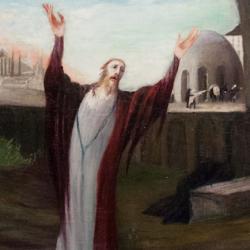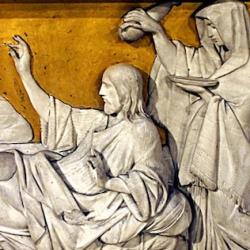Matthew describes two sets of witnesses in the Sanhedrin trial of Jesus. One is a set of false witnesses, but they fail to bring convincing testimony. There is a second set of witnesses, two witnesses, who come “later” (v. 60). These witnesses bring a united testimony, one that passes the procedural test, the rules of evidence, the requirement of two or three witnesses. And, even better, their testimony happens to be true . They claim that Jesus said He was able to destroy the temple and rebuild it in three days. Matthew doesn’t record this statement, but it’s the kind of thing Jesus might say, and John records that He actually did say it, though He was talking about the temple of His own body, not the physical temple of Jerusalem.
The charge has to do with Jesus’ claims about His power, His ability to destroy and rebuild. Jesus says He can destroy and rebuild a temple. For several years, He has been giving sight to the blind, hearing to the deaf; He’s been healing the lame and raising the dead. He has been rebuilding temples for three years, with a word, and do they think He’s incapable of destroying and raising a temple of stone? Not only is it true that Jesus said what the witnesses say, but He has demonstrated over and over that His claim to such power is perfectly true as well.
Yet, the high priest thinks that here is something he can work with. He presses the point with Jesus. Did you say this? Don’t you have anything to say in your defense? What did you mean by this? When Jesus doesn’t answer, the high priest places Jesus under oath, and demands to know whether or not Jesus is the Christ, the anointed One, the Son of God who according to Scripture will come to build the temple. Jesus acknowledges that the high priest has spoken correctly: He is the Son of God, the temple-building Son of David. And then Jesus, as He so often does, raises the stakes by adding that He is not only the Messiah but that someday the high priest himself will perceive that Jesus is the Son of Man, the one exalted to the ancient of days in the prophecy of Daniel. He says that He is the Lord who sits on the right hand of Yahweh, as Psalm 110 prophesies.
It is this testimony that finally convicts Jesus: The testimony of two witnesses who quote something Jesus actually said, something true; and Jesus’ own testimony to His status as Son of Man and Davidic Son of God. In other words, Jesus is not convicted by all the false testimony, but by true testimony.
Everything has been done right here. Everything . Procedurally, the trial is impeccable; the Sanhedrin gets its two witnesses who agree on their testimony. Their witness happens to be true, and then the witness is confirmed by the testimony of the accused Himself. Best of all, the combined evidence points to a capital crime, blasphemy.
Everything is right here, everything impeccably done – except that in convicting Jesus, they are convicting Yahweh incarnate. They follow the law to a tee, and end up convicting the lawgiver of blasphemy.
Thus is the law made impotent because of the flesh.











